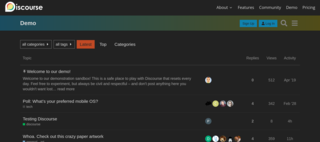
Ruby on Rails, or Rails, is a server-side web application framework written in Ruby under the MIT License. Rails is a model–view–controller (MVC) framework, providing default structures for a database, a web service, and web pages. It encourages and facilitates the use of web standards such as JSON or XML for data transfer and HTML, CSS and JavaScript for user interfacing. In addition to MVC, Rails emphasizes the use of other well-known software engineering patterns and paradigms, including convention over configuration (CoC), don't repeat yourself (DRY), and the active record pattern.
This article outlines the general features commonly found in various Internet forum software packages. It highlights major features that the manager of a forum might want and should expect to be commonly available in different forum software. These comparisons do not include remotely hosted services which use their own proprietary software, rather than offering a package for download which webmasters can host by themselves.

Capistrano is an open-source tool for running scripts on multiple servers; its main use is deploying web applications. It automates the process of making a new version of an application available on one or more web servers, including supporting tasks such as changing databases.
Textile is a lightweight markup language that uses a text formatting syntax to convert plain text into structured HTML markup. Textile is used for writing articles, forum posts, readme documentation, and any other type of written content published online.

Jonathan Gillette, known by the pseudonym why the lucky stiff, is a writer, cartoonist, artist, and programmer notable for his work with the Ruby programming language. Annie Lowrey described him as "one of the most unusual, and beloved, computer programmers" in the world. Along with Yukihiro Matsumoto and David Heinemeier Hansson, he was seen as one of the key figures in the Ruby community. His pseudonym might allude to the exclamation "Why, the lucky stiff!" from The Fountainhead.
TinyMCE is an online rich-text editor released as open-source software under the LGPL. It has the ability to convert HTML textarea fields or other HTML elements to editor instances. TinyMCE is designed to easily integrate with JavaScript libraries such as React, Vue.js, AngularJS and Bootstrap as well as content management systems such as Joomla!, and WordPress.

Aptana, Inc. is a company that makes web application development tools for use with a variety of programming languages. Aptana's main products include Aptana Studio, Aptana Cloud and Aptana Jaxer.
The Spry Framework is an open source Ajax framework developed by Adobe Systems which is used in the construction of Rich Internet applications. Unlike other pure JavaScript frameworks such as the Dojo Toolkit and Prototype, Spry is geared towards web designers, not web developers. On August 29, 2012, Adobe announced that it will no longer continue development of Spry and handed it over to the community on GitHub.

ColdFusion on Wheels is an open-source web application framework designed for applications written in ColdFusion Markup Language.
GitHub, Inc. is a provider of Internet hosting for software development and version control using Git. It offers the distributed version control and source code management (SCM) functionality of Git, plus its own features. It provides access control and several collaboration features such as bug tracking, feature requests, task management, continuous integration and wikis for every project. Headquartered in California, it has been a subsidiary of Microsoft since 2018.

Pledgie was a donation website created by Mark Daggett and Garry Dolley that ran on the Ruby on Rails web application framework. The creators have also worked on Revver.com and decided to create Pledgie after meeting each other there and discovering that both had an interest for open source software and the Ruby language.

Nokogiri is an open source software library to parse HTML and XML in Ruby. It depends on libxml2 and libxslt to provide its functionality.

Homebrew is a free and open-source software package management system that simplifies the installation of software on Apple's operating system, macOS, as well as Linux. The name is intended to suggest the idea of building software on the Mac depending on the user's taste. Originally written by Max Howell, the package manager has gained popularity in the Ruby on Rails community and earned praise for its extensibility. Homebrew has been recommended for its ease of use as well as its integration into the command line interface. Homebrew is a non-profit project member of the Software Freedom Conservancy, and is run entirely by unpaid volunteers.
Cucumber is a software tool that supports behavior-driven development (BDD). Central to the Cucumber BDD approach is its ordinary language parser called Gherkin. It allows expected software behaviors to be specified in a logical language that customers can understand. As such, Cucumber allows the execution of feature documentation written in business-facing text. It is often used for testing other software. It runs automated acceptance tests written in a behavior-driven development (BDD) style.

Discourse is an open source Internet forum and mailing list management software application founded in 2013 by Jeff Atwood, Robin Ward, and Sam Saffron. Discourse received funding from First Round Capital and Greylock Partners. The application is written with Ember.js and Ruby on Rails. PostgreSQL serves as its back-end database management system.

Jekyll is a static site generator. Written in Ruby by Tom Preston-Werner, GitHub's co-founder, it is distributed under the open source MIT license.

Coraline Ada Ehmke is a software developer and open source advocate based in Chicago, Illinois. She began her career as a web developer in 1994 and has worked in a variety of industries, including engineering, consulting, education, advertising, healthcare, and software development infrastructure. She is known for her work in Ruby, and in 2016 earned the Ruby Hero award at RailsConf, a conference for Ruby on Rails developers. She is also known for her social justice work and activism, writing the Contributor Covenant and Post-Meritocracy Manifesto, and promoting the widespread adoption of codes of conduct for open source projects and communities.
The Contributor Covenant is a code of conduct for contributors to free/open source software projects, created by Coraline Ada Ehmke. Its stated purpose is to reduce harassment of minority, LGBT and otherwise underrepresented open source software developers.











